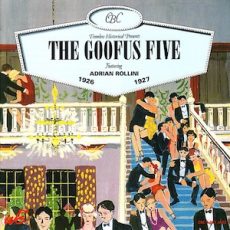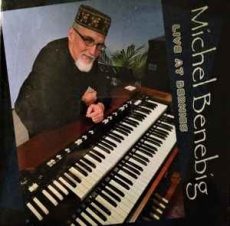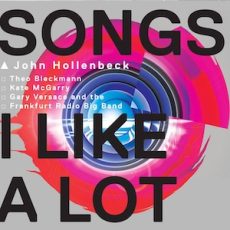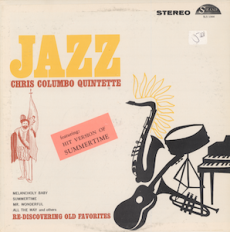
Daily Dose Of Jazz…
Adrian Francis Rollini was born June 28, 1903 in New York City, New York of French and Swiss extraction. Growing up in Larchmont, New York, he showed musical ability early on and began to take piano lessons at the age of two. Considered a child prodigy, he played a fifteen-minute recital at the Waldorf Astoria Hotel at the age of four. By age 14 he was leading his group composed of neighborhood boys, in which he doubled on piano and xylophone.
Leaving high school in his third year he cut piano rolls for the Aeolian company on their Mel-O-Dee label and the Republic brand in Philadelphia, Pennsyolvania. At 16 he joined Arthur Hand’s California Ramblers and being equally skilled at piano, drums, xylophone, and bass saxophone, gained him Hand’s respect. Hand transferred the band to Rollini when he retired from the music field.
During the 1920s not only was he a member of the California Ramblers with Red Nichols, Jimmy and Tommy Dorsey, he also held membership in The Little Ramblers, The Goofus Five, and The Golden Gate Orchestra. During this time, he managed to lay down hundreds of sessions with Annette Hanshaw, Cliff Edwards, Joe Venuti, Miff Mole, Red Nichols, Bix Beiderbecke, Roger Wolfe Kahn, and Frank Trumbauer.
The 1930s saw him forming the Adrian Rollini Orchestra which recorded on Perfect, Vocalion, Melotone, Banner, and Romeo labels, where he played both bass saxophone and vibraphone. During the early swing era, starting in 1935, he managed Adrian’s Tap Room, owned the Whitby Grill, and opened White Way Musical Products, a store for the sale and repair of musical instruments.
Gradually shifting from the bass saxophone to the vibraphone after popularity of the hot jazz era of the 1920s waned. He went on to play hotels, arranging and writing songs behind the scenes. After an exhaustive career, he made his last recording with his trio in the early 1950s. He relocated to Florida, opened the Eden Roc Hotel in 1955, ran the Driftwood Inn at Tavernier Key and his Driftwood offered deep-sea fishing charters.
Bass saxophonist, pianist, and vibraphonist Adrian Rollini, died under unsolved circumstances on May 15, 1956 at the age of 52 in Homestead, Florida.
More Posts: bandleader,history,instrumental,jazz,music,piano,saxophone,vibraphone

Daily Dose Of Jazz…
Michel Benebig was born in Nouméa, New Calédonia, South-Pacific on June 27, 1964. He started playing bass guitar, accordion and keyboards in dancing bands at age 11. He studied classical piano from 16 to 26 yers old, at the Noumea Music-School, then in France at C.N.R de Besancon from 1990 to 1992.
Michel started playing the Hammond B3 organ in 1992. As a self-taught musician he taught himself how to play foot-pedal bass and jazz organ techniques. Meeting Jimmy McGriff in Atlanta, Georgia in 1995, Jimmy Smith in Oakland, California and Rhoda Scott in Nouméa the following year.
Michel has performed with guitarist Bruce Forman, drummer Lewis Nash, organist Tony Monaco, guitarist Randy Johnston and many more.
Organist, composer and bandleader Michel Benebig who is the founder of the Association des Musiciens de Jazz & Blues pour les Echanges et la Création Artistique, Artistic Director of YAARI, continues to perform and tour.
More Posts: bandleader,history,instrumental,jazz,music,organ

Daily Dose Of Jazz…
John Hollenbeck was born June 19, 1968 in Binghamton, New York and earned degrees in percussion and jazz composition from the Eastman School of Music. He moved to New York City in the early 1990s. He has worked with Bob Brookmeyer, Fred Hersch, Tony Malaby, the Vanguard Jazz Orchestra, Kenny Wheeler, Pablo Ziegler, and Meredith Monk.
In 1998, he composed The Shape of Spirit, a piece for wind ensemble on Mons Records. The following year he composed Processional and Desiderata for wind ensemble and orator. This composition, written for and featuring the voice and trombone of Bob Brookmeyer, was released on Challenge Records in 2001.
Hollenbeck went on to receive several commissions from the Bamberg Choir and the Windsbacher Knabenchor in Germany, Bang on a Can, the People’s Commissioning Fund, the IAJE Gil Evans Fellowship, and in addition he composed and performed the percussion score to the following Meredith Monk works: Magic Frequencies, Mercy and The Impermanence Project.
His 2000 debut release Static Still with Theo Bleckmanne began his recording as a leader and in 2001 his sophomore project No Images landed on Gary Giddins’ Village Voice Top Ten list. He has gone on to record nine more albums to date as a leader and nine albums with the Claudia Quintet.
Drummer John Hollenbeck, who was an eleven year professor of jazz drums and improvisation at the Jazz Institute Berlin and in 2015 joined the faculty of Schulich School of Music, continues to perform.
More Posts: bandleader,drums,educator,history,instrumental,jazz,music

Daily Dose Of Jazz…
Joseph Christopher Columbus Morris was born on June 17, 1902 in Greeenville, North Carolina. He led his own band from the 1930s into the late 1940s, holding a residency at the Savoy Ballroom for a period. During the mid 1940s he began drumming behind Louis Jordan, remaining with him until 1952. In the mid-to-late 1950s, Columbo backed Wild Bill Davis’s organ combo, and he recorded with Duke Ellington in 1967.
He worked again as a leader in the 1970s, in addition to doing tours of Europe with Davis. While in France he played with Floyd Smith, Al Grey, Eddie “Cleanhead” Vinson, Buddy Tate, and Milt Buckner. He got his first professional gig playing with Fletcher Henderson in 1921. Between the 1920s and the 1960s, Columbo played at most of the city’s nightclubs, and led the Club Harlem Orchestra for 34 years until 1978, when the club shut its doors.
Columbo worked, recorded, and toured with prominent jazz artists including Dizzy Gillespie, Louis Armstrong and Ella Fitzgerald. He did an album on the Strand label called Jazz: Re-Discovering Old Favorites by the Chris Columbo Quintette featuring organist Johnny “Hammond” Smith. He appeared in the 1945 film It Happened In Harlem, based on the Harlem nightclub Smalls Paradise and the 1947 film Look Out Sister.
Prior to suffering a stroke in 1993 which partially paralyzed, Columbo was the oldest working musician in Atlantic City. Chris’ band went on to perform at practically every Atlantic City casino hotel. At the time of his stroke, he was playing regularly at the Showboat.
Drummer Chris Columbo, who was a father figure to Sonny Payne, who was also known as Crazy Chris Columbo and sometimes credited as Joe Morris on record, died on August 20, 2002 in New Jersey. He was 100 years old.
More Posts: bandleader,drums,history,instrumental,jazz,music

Daily Dose Of Jazz…
Alfred Viola was born on June 16, 1919 in Brooklyn, New York and grew up in an Italian family. He learned to play the guitar and mandolin as a teenager. Enlisting in the Army during World War II and played in an Army jazz band from 1942 to 1945.
He started a trio with pianist Page Cavanaugh and bassist Lloyd Pratt. The band appeared in several films, including Romance on the High Seas with Doris Day, and played a few dates in 1946 and 1947 with Frank Sinatra. Viola continued to work with Sinatra regularly, accompanying him on several hundred studio recordings and concert dates between 1956 and 1980.
Viola was a session musician in Los Angeles, California performing in films and television. His mandolin playing can be heard on the soundtrack of The Godfather. Other credits include West Side Story and Who’s Afraid of Virginia Woolf? He continued playing jazz as well, with Bobby Troup, Ray Anthony, Harry James, Buddy Collette, Stan Kenton, Gerald Wilson and Terry Gibbs.
He worked as a session musician on over 500 albums, including releases by Natalie Cole, Neil Diamond, Marvin Gaye, Julie London, Steve Lawrence, Linda Ronstadt, Jimmy Witherspoon, Helen Humes, June Christy, Ella Fitzgerald, Anita O’Day, Nelson Riddle, and Joe Williams.
Viola and Cavanaugh reunited in the 1980s with Phil Mallory and continued to play regularly in Los Angeles until the late 1990s.
Guitarist Al Viola, recorded ten albums as a leader, died of cancer on February 21, 2007 at the age of 87 in Los Angeles.
More Posts: bandleader,guitar,history,instrumental,music


